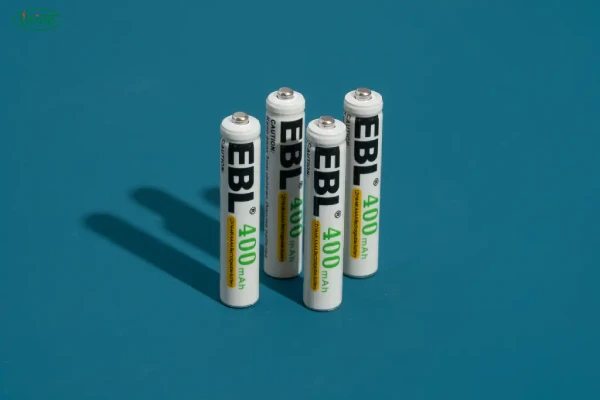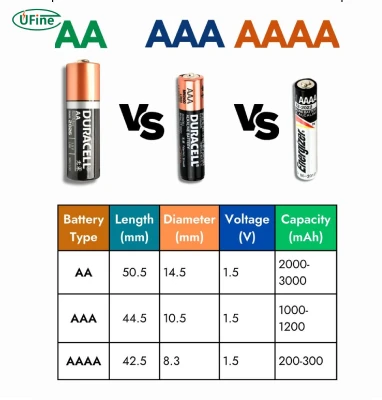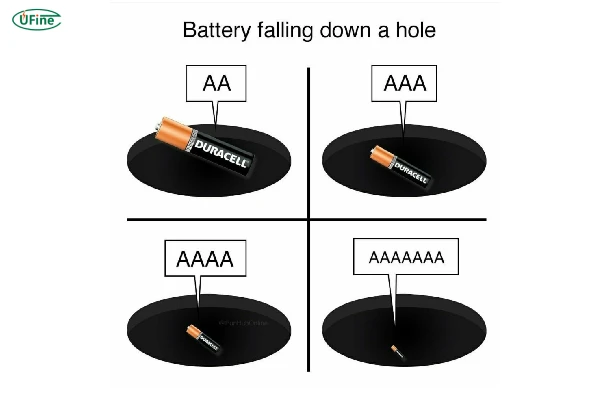Batteries are an integral part of modern electronics, powering everything from wireless headsets to medical devices. The global battery market is projected to grow to $150 billion by 2030, driven by demand for compact, high-performance energy solutions.
Among the various battery sizes available, AAAA batteries (Quadruple-A batteries) are less common but play a crucial role in powering ultra-thin electronic devices. However, many consumers are unfamiliar with them, often mistaking them for AAA batteries.
In this article, we’ll cover everything you need to know about AAAA batteries, including:
✔ Types, voltage, and capacity
✔ Applications and lifespan
✔ Key differences between AAA and AAAA batteries
✔ Rechargeable AAAA battery options
✔ Are they right for your device?
For businesses and manufacturers needing customized lithium batteries, Ufine Battery specializes in custom lithium-ion, lithium-polymer, and LiFePO4 batteries tailored to various voltage, capacity, and size requirements. Contact Us Now!
Part 1. What is an AAAA battery?

An AAAA battery is a small, cylindrical power cell often used in compact electronics that require a slim, lightweight energy source. It is thinner and lighter than an AAA battery, making it ideal for styluses, medical instruments, and miniature remote controls.
Key Features of AAAA Batteries:
🔹 Size: 42.5mm in length, 8.3mm in diameter
🔹 Voltage: Typically 1.5V (alkaline) or 3.7V (lithium)
🔹 Capacity: 500mAh to 1000mAh depending on type
🔹 Applications: Small electronics, medical devices, and styluses
🔹 Available in both disposable and rechargeable versions
Need Custom Battery Solutions?
If your device requires a specific battery size, shape, or voltage, Ufine Battery can provide custom lithium-ion and lithium-polymer battery solutions.
Part 2. Types of AAAA batteries: which one should you choose?
AAAA batteries come in various chemical compositions, each with distinct performance characteristics.
1. Alkaline AAAA Batteries
🔹 Most common type of AAAA battery
🔹 Provides 1.5V of power
🔹 Non-rechargeable (single-use)
🔹 Best for low-drain devices (styluses, remote controls)
🔹 Typically lasts 2-6 months in low-power devices
2. Lithium AAAA Batteries
🔹 Higher energy density than alkaline versions
🔹 Available in 1.5V to 3.7V configurations
🔹 Lightweight and durable, even in extreme temperatures
🔹 Used in medical devices, wireless headsets, and sensors
🔹 Longer lifespan than alkaline AAAA batteries
3. Rechargeable AAAA Batteries
🔹 Usually lithium-ion or lithium-polymer
🔹 Provides 3.7V and can be recharged 300-500 times
🔹 Ideal for frequent-use devices like digital pens and earpieces
🔹 Reduces battery waste and long-term costs
Looking for Rechargeable AAAA Batteries?
Ufine Battery specializes in custom rechargeable lithium batteries for industrial and consumer applications.
Part 3. Voltage and capacity
Choosing the Right Voltage
Understanding the voltage and capacity of AAAA batteries is crucial to ensuring compatibility with your device.
| Battery Type | Voltage | Capacity (mAh) | Rechargeable |
|---|---|---|---|
| Alkaline AAAA | 1.5V | 500-600 | No |
| Lithium AAAA | 1.5V-3.7V | 600-1000 | Yes |
| NiMH AAAA | 1.2V | 300-600 | Yes |
Choosing the Right Voltage
- 1.5V alkaline AAAA batteries are ideal for low-power gadgets.
- 3.7V lithium AAAA batteries are best for high-drain devices.
- Rechargeable lithium AAAA batteries offer long-term savings.
Custom Voltage Options Available
If you require specialized voltage configurations, Ufine Battery can design custom lithium batteries to meet your needs.
Part 4. Where are AAAA batteries used?
AAAA batteries are designed for compact, lightweight devices that require stable power.
Common Applications
✔ Digital styluses (Surface Pen, Samsung S Pen, etc.)
✔ Medical devices (blood glucose meters, hearing aids, digital thermometers)
✔ Bluetooth earpieces and wireless headsets
✔ Mini flashlights and laser pointers
✔ Compact remote controls
If you own a slim, high-precision electronic device, there’s a good chance it uses an AAAA battery.
Part 5. How long do AAAA batteries last?
The lifespan of an AAAA battery depends on usage and battery type.
- Alkaline AAAA batteries last 2-6 months in low-power devices.
- Lithium AAAA batteries can last up to 1 year in some devices.
- Rechargeable AAAA batteries can be recharged 300-500 times before losing efficiency.
Tips to Extend Battery Life:
✔ Turn off devices when not in use.
✔ Store batteries in a cool, dry place.
✔ Use rechargeable batteries for frequent-use devices.
Part 6. AAAA vs. AAA batteries: what’s the difference?
Although AAA and AAAA batteries may look similar, they have distinct differences in size, capacity, and application.
| Feature | AAA Battery | AAAA Battery |
|---|---|---|
| Size | 44.5mm × 10.5mm | 42.5mm × 8.3mm |
| Voltage | 1.2V – 1.5V | 1.5V – 3.7V |
| Capacity | 800-1200mAh | 500-1000mAh |
| Usage | Remote controls, toys | Styluses, medical devices |

Can You Use AAAA Batteries Instead of AAA?
No, AAAA batteries are smaller and provide less capacity, making them incompatible with most AAA battery slots.
What Batteries Can Replace AAAA?
If AAAA batteries are unavailable, alternatives include:
- Lithium rechargeable options (if voltage matches).
- Two button cell batteries in some cases.
However, using the correct battery is always recommended.
Part 7. Are AAAA batteries right for your device?
Before purchasing AAAA batteries, consider:
✔ Size and compatibility – Check if your device specifically requires AAAA batteries.
✔ Voltage needs – Some devices require 1.5V, while others need 3.7V.
✔ Rechargeable vs. disposable – Rechargeable batteries are more cost-effective in the long run.
✔ Usage frequency – If you use your device daily, rechargeable lithium batteries may be the best option.
If you need custom battery solutions for industrial, medical, or consumer electronics, Ufine Battery can design high-performance lithium-ion and lithium-polymer batteries tailored to your requirements.
Part 8. AAAA battery price: what to expect?
The price of AAAA batteries varies based on type and brand:
- Alkaline AAAA batteries: $1 – $3 per unit
- Lithium AAAA batteries: $3 – $6 per unit
- Rechargeable AAAA batteries: $10 – $20 per pack
Part 9. FAQs
1. Can I Use Multiple Button Cell Batteries Instead of an AAAA Battery?
In some cases, stacking LR44, AG13, or CR2032 button cells can match the voltage of an AAAA battery. However, this is not recommended due to size, fitment, and safety concerns. Always check your device’s requirements before substituting.
2. How Do I Properly Dispose of AAAA Batteries?
Dispose of alkaline AAAA batteries at designated recycling centers or battery drop-off points. Rechargeable lithium AAAA batteries should be taken to electronic waste recycling facilities to prevent environmental damage.
3. Do AAAA Batteries Expire?
Yes, like all batteries, AAAA batteries have a shelf life: Alkaline AAAA batteries: 5-7 years if stored properly; Lithium AAAA batteries: 10+ years; Rechargeable AAAA batteries: 3-5 years depending on usage cycles. To extend shelf life, store batteries in a cool, dry place away from direct sunlight.
4. Are There High-Drain AAAA Batteries for Power-Hungry Devices?
Yes, high-drain AAAA lithium batteries are designed for devices that require a stable, long-lasting power supply, such as hearing aids, medical tools, and wireless headsets. These offer higher capacity and better performance than standard alkaline versions.
5. Can I Take AAAA Batteries on an Airplane?
Yes, disposable alkaline AAAA batteries are safe for travel in both carry-on and checked baggage. However, rechargeable lithium AAAA batteries must be carried in your carry-on due to fire safety regulations.
6. Why Are AAAA Batteries More Expensive Than AAA?
AAAA batteries are produced in smaller quantities and used in specialized devices, which results in higher production costs per unit. Additionally, lithium-based AAAA batteries offer longer lifespan and better performance, making them more expensive than standard alkaline AAAA batteries.
Related Tags:
More Articles

How to Choose the Best Floor Scrubber Battery for Commercial Cleaning?
Selecting the ideal floor scrubber battery ensures a long runtime, rapid charging, and minimal maintenance for efficient commercial cleaning operations.
Battery for Blower vs Battery for Leaf Vacuum: Which One Should You Choose?
Battery for blower vs leaf vacuum—learn the key differences in power, fit, and runtime to choose the right battery for your outdoor tool needs.
How to Choose the Right Battery for Blower?
Choosing the right blower battery? Consider voltage, capacity, chemistry & usage. This guide helps match the best battery for peak performance.
How to Choose the Best Insulated Battery Box for Lithium Batteries?
Choosing the Best Insulated Battery Box for Lithium Batteries? Discover key factors such as size, material, and safety for optimal protection and performance.
7 Critical Elements on a Lithium Battery Shipping Label
What must be on a lithium battery shipping label? Learn 7 key elements to ensure safety, legal compliance, and correct handling across all transport modes.




